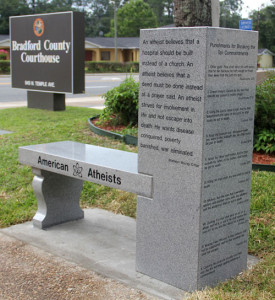If ever there was a pious myth and a piece of credulous superstition, it is the liberal-rationalist belief that, a few hiccups apart, we are all steadily en route to a finer world.
Category “Apologetics”
Naturalistic Humanism as Religon – Part 2
In my last post on the subject, I mentioned that naturalist humanism has to borrow from religion in order to function in real life. I found the following bit in an Answers Research Journal article on the philosophy of Stanley Fish:
Fish’s aim is yet again accurate when he takes on liberalism’s failure to invest human life with meaning. Fish relates a story philosopher Jürgen Habermas tells about his own life. Habermas had a Swiss friend who, though never a religious believer during his life, elected to have a church funeral. Habermas says his friend
had sensed the awkwardness of non-religious burial practices and, by his choice of place, publicly declared that the enlightened modern age has failed to find a suitable replacement for a religious way of coping with the final rite de passage.
But Fish himself can do no better. Although he knows the Bible fairly well, he has yet to recognize that all the foundations of all the interpretive communities in the world must beg, borrow, and steal from the biblical foundation to have morality, a telos, or other things that all worldviews require. Fish has not seen (or will not admit) that every one of the masons who constructed those foundations did his work with at least some—albeit suppressed and twisted—stones of Christian truth.
I read the following definition of an “atheistic” funeral on a funeral planning website:
The humanist view rejects the idea of an afterlife and interprets death as the end to an individual’s consciousness. They believe that human beings are simply another part of nature — and that death is nature’s way of cleansing. Through death, we clear the way for new life.
Humanists view life as a chance to have stimulating, joyful experiences and to live an ethical and good life. The humanist’s funeral affirms these beliefs and celebrates the passing life.
Look at the incongruity here. An atheistic funeral is the celebration of the fact that a loved one’s life has been eradicated by nature in order to “clear the way for new life.” Life itself is described as a chance to have joyful experiences and live an ethical life. Think about it. To a naturalistic humanist, joy is just a chemical reaction designed to promote positive actions. Ethics without an external source are relative to each person’s personal belief. Even the desire to be ethical is just another chemical reaction promoting positive social interaction for the benefit of the group. The entire description above is personally degrading and philosophically useless – unless one borrows from religion the meaning of joy and ethics and good.
Naturalistic Humanism as Religion
 So an Atheist group had a granite bench placed next to a Ten Commandments monument at a Florida courthouse. It has been inscribed with an odd collection of quotes like, “An atheist believes that a hospital should be built instead of a church.” This got me thinking about the tendency of naturalistic humanism to borrow from religion. I’ve decided to start a series of posts detailing this ideological bleed-over.
So an Atheist group had a granite bench placed next to a Ten Commandments monument at a Florida courthouse. It has been inscribed with an odd collection of quotes like, “An atheist believes that a hospital should be built instead of a church.” This got me thinking about the tendency of naturalistic humanism to borrow from religion. I’ve decided to start a series of posts detailing this ideological bleed-over.
Example #1 comes from well-know Atheist and writer Sam Harris. In an essay titled Science Must Destroy Religion, he laments the need to practice religious tolerance, says that religion is spoiling the fruits of human inquiry, and calls on scientists to blast, “the hideous fantasies of a prior age.” But he ends the essay with a suggestion that, “We must find ways of meeting our emotional needs.” He continues:
We must learn to invoke the power of ritual and to mark those transitions in every human life that demand profundity – birth, marriage, death – without lying to ourselves about the nature of reality… When we find reliable ways to make human beings more loving, less fearful, and genuinely enraptured by the fact of our appearance in the cosmos, we will have no need for divisive religious myths.
The problem here is that in naturalistic humanism, man is a cosmological accident without free will, a “wet robot.” Birth, marriage, and death are just biological necessities, often driven by the function of reproduction. There is no being in control and there is no ultimate purpose for mankind in the universe. This hardly makes us more loving, less fearful, and enraptured by our appearance in the cosmos. Our emotional needs don’t have an answer in naturalistic humanism so they must be “borrowed” from religion. Even Sam Harris doesn’t presume how to do this. That’s not to say that people haven’t tried. I’ll explore some of their ideas in further posts.